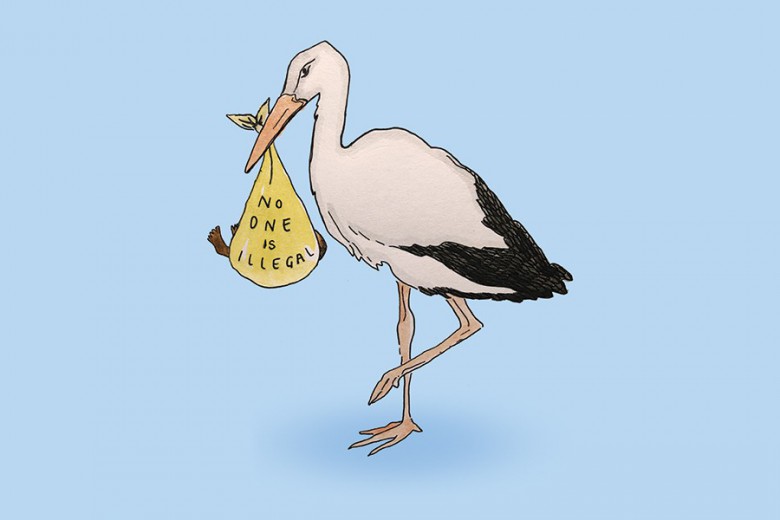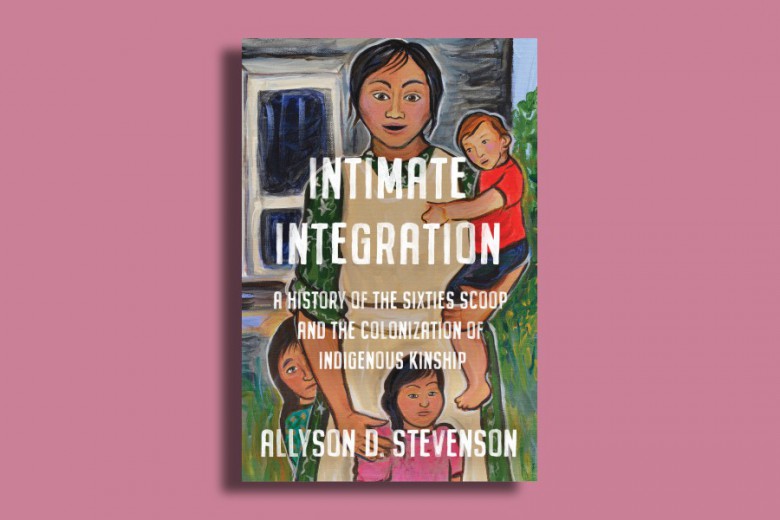Now that I’m 22 weeks pregnant, the baby advice websites have begun to differ. BabyCenter asks us to picture a spaghetti squash; the Bump, a coconut; Parents.com, a papaya. I am due at the beginning of December. The clothes that fit consist of one pair of pregnancy shorts, a thrifted button-down, and a handful of men’s T-shirts. I feel the baby kicking daily now.
My partner is a PhD candidate finishing his dissertation, and I’m a freelance writer and editor. Our combined household income is never very high, but we live thriftily, both wanted to be parents, and didn’t particularly want to wait until we were more financially secure – that moment may never come. As a freelancer who works from home, I won’t be able to stop working after I give birth. Parental leave for most Canadian freelancers, who are classed as self-employed, is technically possible if you choose to pay into employment insurance (EI) for 12 months before you need to access it and continue paying afterwards; but without an employer top-up, 55 percent of a freelancer’s annual income is unlikely to sustain someone who is just barely making ends meet as it is. (Alternatively phrased: 55 percent of peanuts is shells.) Labouring under the understanding that I wouldn’t receive any leave at all, I hustled to earn more – thinking, maybe I can work less for the first few months after the baby arrives – but the bump in my monthly income just meant I needed to start repaying my government student loans.
In the early parts of pregnancy, as I was hoping not to miscarry, I’d picture my partner and myself hanging out with the baby on a picnic blanket in Jarry Park, north of our apartment in Montreal; holding a strawberry, our baby would point up at the sky and laugh. Now, as the weeks tick away, I find myself picturing how I’ll work around a nursing pillow or a baby sling – can I hold my elbows out far enough? Should I learn to use a dictation tool?
As the weeks tick away, I find myself picturing how I’ll work around a nursing pillow or a baby sling – can I hold my elbows out far enough? Should I learn to use a dictation tool?
Approximately 15 per cent of Canada’s workforce was self-employed last year – just under 2.8 million people. Of these 2.8 million, 1.9 were self-employed with no employees working under them. Freelance labour has been a constant for magazine writing for decades; as mastheads and newsrooms shrink, roles that may have belonged to staff in the past – think fact checkers – have gone freelance at magazines, while newsrooms have come to rely more on freelance writers to fill their pages, and have contracted out functions like copy-editing. While some publishers favour freelance boosterism, especially for millennials – a National Post article last year focused on six-figure freelancers and fixing gig work’s bad reputation – more tempered articles acknowledge that while millennials have adapted to gig work, the majority would prefer the security of a nine-to-five.
A preliminary report compiled by the Canadian Media Guild in 2013 found that a total of 10,000 jobs were cut across print and broadcast media between 2008 and 2013; since then, high-profile newsroom cutbacks have taken place at the Toronto Star, VICE Media, and Postmedia, among others. In 2016, the Canadian Journalism Project J-Source found that newsroom journalists (most of whom are unionized) earned an average of $46,621 annually. By contrast, research conducted by Nicole Cohen, author of the landmark book Writers’ Rights, found that three quarters of freelancers earn less than $40,000 a year, and a whopping 45 percent earn less than $20,000.
Nora Loreto, a freelancer and the Quebec director of the Canadian Freelance Union (CFU), details what freelancers have lost beyond simple wages. “When you’re a freelancer, because corporations have outsourced the social safety net of employees to the state, you are 100 per cent reliant on the state for everything from parental leave to sick leave,” she says. “If you break your hand and need to type, you’re on your own. If you give birth, you’re on your own. If your parent or partner becomes sick, you’re on your own.”
It’s not all grim: as Philip Moscovitch, a full-time freelancer and father of three kids, told me, working at home with his kids is not only rewarding from his perspective as a parent, it also provides fodder for freelance writing. (Moscovitch laughs as he relays what his son eventually told him: “I’m sick of being interviewed. I just want to live my life.”) Even before I give birth, my kid is providing fodder – for this article and others, and for a book chapter I’m writing about pregnancy and gender identity. But I can’t tell if this is a blessing or a curse: I value the opportunity for self-expression at the same time I worry I’ve trained my brain to stage a running can-I-capitalize-on-this analysis of the daily events of my life instead of actually living it.
Moreover, as my partner edits his PhD thesis, his sole source of income is freelance writing and editing work, too. We don’t have supplemental health insurance or family nearby, and the plan is to pay our rent and bills with the money we generate working from home in Montreal (one cheap-rent mark in the plus column) with a newborn, as we’re figuring out how to be parents. Both millennials, our circumstances are both worrisome and worryingly common.
At the four-month-pregnant mark, I started to wonder how other people manage. When Will and I decided to try to get pregnant, I’d reassured him that it would all work out. We’ve always been stable enough, together, to pay rent, bills, and taxes on time, even if it has sometimes meant stretches of using lots of rice and pulses in our cooking. But could we continue to do the same? Between nursing, nurturing, and sleep deprivation, was it bananas to think we could sustain our work levels?
Thankfully, the nice part of freelancing is that most other freelancers are generous with their time and advice. Lindsay Zier-Vogel, a writer and grant writer who is raising a toddler and an infant with her husband, says she’s learned to be upfront with potential clients that she has kids and may not always be immediately available. She’s learned to schedule and work more efficiently, in small bursts. “Sometimes you can do really great work in 10 minutes,” she tells me.
Between nursing, nurturing, and sleep deprivation, was it bananas to think we could sustain our work levels?
Both Zier-Vogel and Moscovitch shifted the type of freelance writing they did, particularly in their kids’ early years. Moscovitch, who’d worked for the National Film Board before going freelance, emphasized the importance of corporate writing work. Zier-Vogel has opted for grant writing. (As a writer who has frequently subsidized my own magazine journalism – I did not break even on the research costs for the essay that won me a National Magazine Award, for example – this strikes me as simultaneously practical, depressing, and a call to arms for better journalism funding.) Moscovitch, whose kids are now in their late teens and early 20s, says he doesn’t want to romanticize raising three kids while freelancing – it was tough, he said, especially when his wife went back to school to attain her M.Ed – but speaking to him and Zier-Vogel was, overall, reassuring.
Not every freelancer I spoke with was optimistic about their ability to make ends meet while raising a kid. Erin Flegg, a stubborn Vancouverite and close friend of mine, has been cohabiting with her queer partner for a couple of years now. She and her partner would like to foster or adopt, but Flegg says their circumstances would need to change before that would be possible. Their affordable Vancouver apartment, like Flegg’s work, is precarious, located in a part of the city in which renoviction or demolition feels like a matter of when instead of if. Further, a freelancer for over 10 years, Flegg knows that her income – from freelance writing, admin work, and occasional nanny gigs – isn’t high enough or stable enough to raise a kid. “I don’t have any leeway right now for unexpected expenses,” she tells me. “To be a responsible parent, I have to be financially stable.”
Having grown up in a financially unstable household, I know she is right, and I know she’s being responsible. Am I? My position is that we as members of a society should support each other; that things like health care, education, affordable housing, and child care are basic rights to be honoured, especially in a wealthy economy. The conservative argument against my position is that having kids is a personal choice, one that no one else should be forced to subsidize. I feel personally guilty even as I can dismantle the argument using its own frame: beyond fairness or empathy or compassion, even the most personally responsible capitalist will, as they age, need younger people, both those who are born in Canada and those who immigrate here. Our work funds capitalists’ retirements, young people produce more than they consume, and declining populations – especially those with increasing income disparity – necessarily lead to lessened consumer spending and economic stagnation.
When I ask Flegg what provincial or federal governments could or should be doing to support freelancers, especially those who want to have kids, she asserts that the government has a responsibility to its citizens in the form of ensuring adequate, affordable housing and child care. Zier-Vogel echoes this point: it would be helpful, she says, if child care was affordable and flexible, offering part-time options with different age-level entry points. University of Quebec emeritus economics professor Pierre Fortin points to Quebec as an example of what is possible: per-day public daycare fees, tied to income, range from $7.75 to $21.50 in Quebec, leading to a $10-a-day average in Montreal, compared to $49-a-day and $54-a-day averages in Vancouver and Toronto, respectively. “The labour force participation of mothers increased sharply and persistently,” wrote Fortin in the Globe and Mail. (The current Liberal government, under Trudeau, has pledged to increase federal funding for child care in other provinces – but critics assert that the targeted plan falls short of the framework that would be necessary to make child care universally useful and accessible.)
As Cohen’s Writers’ Rights emphasizes, it’s necessary to switch from the perspective I currently hold – focused narrowly on what steps I can take to personally blunt the edges of precarity – to a perspective that envisions writers and journalists as part of a collective force of workers who will need to band together to demand fairer treatment from employers and governments: affordable universal child care, affordable housing, reasonable minimum wages, better contracts, steadily increasing freelance rates, and the return of staff positions at magazines and newspapers where possible. Joining an organization like the CFU can help; Loreto asserts that the union weighs in on provincial labour consultations to, for example, ensure that workers are not being taken advantage of as freelance or contract employees in specific situations when they should be paid a wage or salary, and afforded whatever job benefits and securities accompany that status. The CFU also advocates for members if contractors withhold payment (Loreto says they’ve recovered thousands of dollars over the past few years), and provides education for members on why, for example, it is not in their best interest to cross a picket line and undercut striking unionized journalists.
It’s necessary to switch to a perspective that envisions writers and journalists as part of a collective force of workers.
Loreto also pointed to another benefit for freelancers who, like me, live in the province of Quebec: while everything other than parental-leave-related EI is handled by the federal government, the province’s Parental Insurance Plan (QPIP) allows self-employed workers to apply for and receive benefits while lessening their work instead of fully ceasing it; QPIP premiums, like prescription drug premiums, are paid by residents of Quebec every year when we file our taxes. Because of the complexity of my work situation (my taxable income last year came from a mix of freelance income and income I earned as a bike mechanic, rendering me ineligible to use the QPIP’s online benefits calculator tool), I won’t know until December, when I give birth, exactly how much I’ll qualify for under the plan – but every little bit helps, and the flexibility of being able to maintain some contracts while pausing other work may mean I’ll have more time to figure out how to simply be a parent instead of a simultaneous stay-at-home, work-from-home parent. QPIP was a saviour for Loreto, who gave birth prematurely to twins in 2013 after several crises during her pregnancy; nationally, a program like it is an option that freelancers could fight for either federally or from their provincial governments.
As Will and I negotiated a rent increase earlier this summer, our landlord argued that what he was asking for was reasonable, and tied to inflation. If you’re a freelancer, ask yourself about the last time your rates went up. Are they tied to inflation, with an annual increase? If not, they should be. Workers before us organized to establish the labour norms we hold dear: the minimum wage, overtime, the weekend. As neoliberalism undercuts these gains, millennials – particularly millennial freelancers – need to band together again to demand fairness and labour protections. This includes both tackling employment regulations – government policies and programs – and demanding more from our employers – starting with increased rates and job security.







